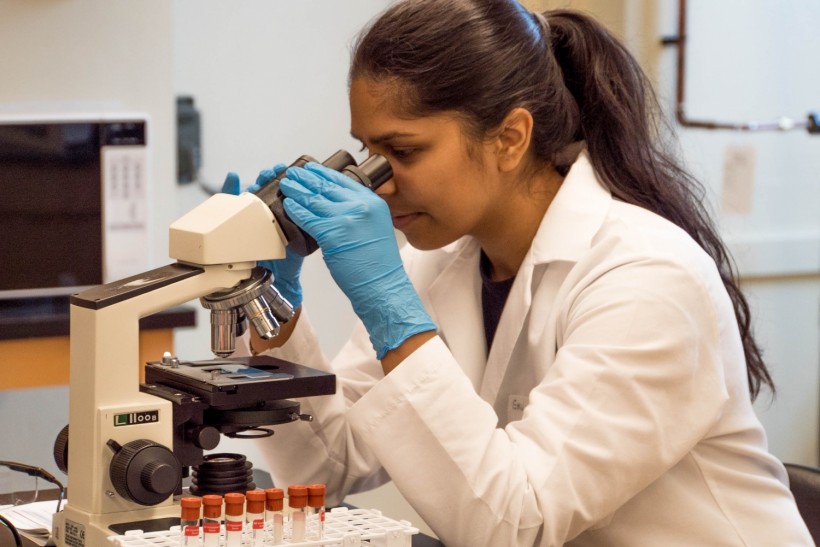While advances in automation are destroying millions of jobs in some industries, science occupations have excellent prospects for 2023.
Being willing to complete advanced studies at university level, building a powerful resume, doing internships, and polishing hard and soft skills are a few examples of the steps science career beginners should take before starting on their journey.
In this article, we will list some of the most in-demand jobs in the sciences, and describe responsibilities, abilities, and education requirements.
We hope you find it helpful in your search for a satisfying work life.
1. Environmental Scientist
Typically, these professionals are employed in government agencies, labs, and consulting companies. Their goal is to monitor the environment and protect public health. Controlling pollution through technical means is also a regular part of their day.
Environmental scientists should have acute observation powers to detect and measure anomalies in companies or public surroundings. As with all scientists, these professionals should possess good communication abilities to be able to inform peers of their findings.
A two-year associate degree in environmental science, environmental health, public health, or a related topic is required by most employers. But some positions might call for a bachelor's degree.
Those thinking about choosing this path should consider taking courses about remote sensing systems, as these are commonly used tools in the field.
Positions for environmental scientists are often published online and may be listed with names like environmental data analyst, sustainability scientist, or air quality technician.
2. Biochemist
Biochemistry researchers are often employed by companies and government agencies, with universities engaging a significant number in their research departments. These professionals specialize in studying chemical processes in living organisms.
They conduct experiments, develop products, and collect information that can be applied in different fields, such as genetics.
A biochemist's skill set should include problem-solving, critical thinking, and strong communication abilities.
Entry-level work is available for biochemistry researchers with bachelor's degrees. A master's degree is helpful in many cases. However, professionals with Ph.D.s. have broader options in research and development fields.
Postdoctoral research appointments are an excellent strategy to get a foot in the door.
3. Forensic Scientist
Experts in forensic sciences receive many names as there are many areas of specialization in the field. These professionals are responsible for a wide range of tasks related to criminal events. From gathering and documenting proof at crime scenes to analyzing evidence and psychological profiles.
As professionals with a high level of responsibility, forensic scientists must be able to pay attention to details, show an ability to think independently, deal with emotionally charged situations, and use the latest forensic technologies effectively.
There are several paths to becoming a forensic scientist. A widely popular one is to graduate from a police academy and then train as a crime scene investigator (CSI).
However, it is not necessary to join the police force to work in this field. Many choose to study a bachelor's in biology or chemistry and then specialize through a master's in forensic science.
The job outlook for forensic science professionals is excellent as government agencies at federal, state, and local levels are expected to constantly increase budgets dedicated to crime prevention.
4. Epidemiologist
Governments and the public have recently become more aware of the devastating consequences that diseases like COVID can generate on a social and economic level. As a result, career prospects for these professionals have skyrocketed, helped by large increases in public health budgets.
Epidemiologists concentrate on investigating infectious diseases and provide advice on precautionary measures. In most cases, these professionals work in laboratories, government agencies, university research departments, and pharmaceutical companies.
Contrary to what many people think, epidemiologists might be active in other public health fields like mental health, occupational health, and the treatment of substance abuse and chronic disease.
Some of an epidemiologist's responsibilities include collecting and interpreting data, outlining plans to control outbreaks, and communicating measures to governments and the public.
A master's degree from an approved college or university is required for epidemiologists. The majority hold an MPH in public health or a closely related discipline, while some have earned Ph.D. degrees in epidemiology or medicine.
In addition to having mathematical and statistical skills, epidemiologists should also be talented communicators, as they must present their findings and plans to the community and other government professionals.
Final Word
Choosing a path in life requires a deep knowledge of yourself. If you love science and felt inspired while reading some of the descriptions above, there is a good chance you could have a prosperous and happy career in one of those fields.
Consider the following advice to assist you in your search:
-
Contact several professionals in the areas in which you're interested. Ask them about their day-to-day lives and how they got to where they are.
-
Get in touch with an occupational counselor to clarify any doubts. They are trained professionals who can help you analyze your strengths and weaknesses.
We wish you a happy and successful search!
* This is a contributed article and this content does not necessarily represent the views of sciencetimes.com



![Humans Will Go Extinct on Earth in 250 Million Years; Mass Extinction Will Occur Sooner if Burning Fossil Fuels Continues [Study]](https://1721181113.rsc.cdn77.org/data/thumbs/full/53373/89/56/50/40/humans-will-go-extinct-on-earth-in-250-million-years-mass-extinction-will-occur-sooner-if-burning-fossil-fuels-continues-study.jpeg)











